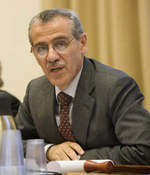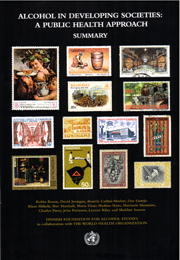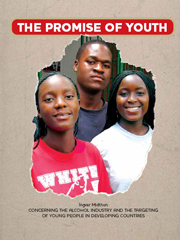
World Health Organization to develop a global strategy to reduce alcohol related harm
In its session Thursday 22 May the World Health Assembly adopted a resolution that calls for the development of a global strategy to reduce harmful consumption of alcohol. The Global Alcohol Policy Alliance welcomes the decision.
WHO now has a mandate to continue working on the alcohol issue and will develop a draft Global Strategy to present to the World Health Assembly in May 2010, with prior discussion at the Excecutive Board meeting in Januar of the same year. We think we this is a very good result, says FORUT, The Norwegian Campaign for Development and Solidarity, in a comments to the WHA decision. (Resolution WHA61.4 Strategies to reduce the harmful use of alcohol)
The Global Alcohol Policy Alliance (GAPA) also welcomed in a statement the passage of the resolution on alcohol policy at the World Health Assembly: "We are pleased that at last WHO has responded to the epidemic of alcohol problems that is increasing with growing alcohol consumption in all parts of the world. GAPA calls on WHO to develop a strong, evidence based global strategy to reduce these problems. We particularly note that the resolution properly distinguishes the roles of commercial and other participants in the development of the strategy and rejects WHO collaboration with the alcoholic beverage industry. GAPA looks forward to working with WHO and other civil society organisations in the important task before us."
The starting point for the discussion at the World Health Assembly in Geneva this week was resolution EB122.R2 from the WHO Executive Board, available here on the WHO web site. The final result required one small, but important, ammendment. Paragraph 2(4) now reads: "to collaborate and consult with Member States, as well as consult with intergovernmental organizations, health professionals, nongovernmental organizations and economic operators on ways they could contribute to reducing harmful use of alcohol."

The debate in the Health Assembly was long, with 36 countries contributing. Most of the interventions thanked the WHO Director General and the Secretariat for the good work done, and appreciated the report presented to the Assembly; A61/13 available here. The resolution passed at the Assembly is the result of a long process, including a resolution in 2005, discussions without conclusion during the WH60 last year, informal consultation by WHO with Member States and the passing of a draft resolution at the WHO Executive Board in January this year. The draft was proposed by Rwanda on behalf of the African member states.
Prior to the debate at the Assembly there were many countries with strong interests in the issue. The suspense lasted until the very end. New Zealand offered the amendment to contribute to reaching consensus. In addition Thailand presented a very strong intervention. Some other ammendments first proposed by Greece and Pallau were later withdrawn in the spirit of consensus. Ecuador accepted the amendment of behalf of the GRULAC (Group of Latin American and Caribbean Countries), as they considered it a clarification of the English translation from the Spanish.
Sri Lanka, on behalf of SEARO-countries, proposed having a " world no acohol day", but did not offer that as an ammendment. Dr. Alwan stated in his comment that the proposal had been "duly noted."
The report from the WHO secretariat (A61/13) which formed the background for the discussion in the Health Assembly outlines that alcohol is one of the main factors contributing to premature deaths and avoidable disease burden worldwide and has a major impact on public health. Although there are regional, national and local differences in levels, patterns and context of drinking, in 2002 the harmful use of alcohol was estimated to cause about 2.3 million premature deaths worldwide (3.7% of global mortality) and to be responsible for 4.4% of the global burden of disease, even when protective effects of low and moderate alcohol consumption on morbidity and mortality have been taken into consideration.
Related articles
![]()
![]()
Developed with CustomPublish CMS by Nettinfo AS



